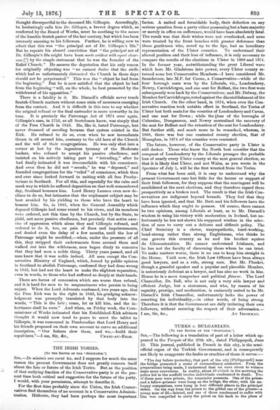THE IRISH TORIES.
(TO THE EDITOR OF THE " SPECTATOR:1 SIR,—De minims non curat lex, and I suppose for much the same reason the present Government does not greatly concern itself about the fate or future of the Irish Tories. But as the position of that outlying fraction of the Conservative' arty is at the pre- sent time both critical and suggestive for the future of the party, I would, with your permission, attempt to describe it.
For the first time probably since the Union, the Irish Conser- vatives find themselves of no account in a Conservative Adminis- tration. Hitherto, they had been perhaps the most important factor. A united and formidable body, their defection on any serious question from a party either possessing but a bare majority or merely in office on sufferance, would have been absolutely fatal. The result was that their wishes were not overlooked, and none were treated by the front benches with greater deference than those gentlemen who, acred up to the lips, had an hereditary representation of the Ulster counties. To understand their altered position and their loss of influence, it is only necessary to compare the results of the elections in Ulster in 1868 and 1874. In the former year, notwithstanding the great Liberal wave which bore Mr. Gladstone into power, every Ulster county re- turned none but Conservative Members—I have considered Mr. Saunderson; late M.P. for Cavan, a Conservative—while of the four borough seats won by the Liberals, viz., Londonderry, Newry, Carrickfergus, and one seat for Belfast, the two first were subsequently won back by the Conservatives; and Mr. Dalway, the Member for Carrickfergus,voted against the disestablishment of the Irish Church. On the other hand, in 1874, when even the Con- servative reaction took notable effect in Scotland, the Tories of Ulster lost both seats for the counties of Londonderry and Cavan, and one seat for Down ; while the !Joss of the boroughs of Coleraine, Dungannon, and Newry neutralised the recovery of the seat for Belfast and the retention of the seat for Londonderry. But further still, and much more to be remarked, whereas, in 1868, there was but one contested county election, that of Monaghan, in 1874 all the counties were contested.
The future, however, of the Conservative party in Ulster is still darker. Those who know the North best consider that the conquest of Londonderry by the Liberals presages the probable loss of nearly every Ulster county at the next general election, so that it is likely that Ulster, and not Wales, as you wrote in the Spectator of July 1, will be the first wrested from the Tories.
From what has been said, it is easy to understand why the present Government care but little for the favour or support of their Irish followers, for they suppose that the contingent will be annihilated at the next elections, and they therefore regard them prospectively as a broken reed. The result is that the Irish Con- servatives are indignant beyond bounds. They feel that they have been ignored, and that Mr. Butt and his followers have the influence which they ought to possess. Of course, there cannot be two opinions, among Liberals at least, as to Mr. Disraeli's wisdom in using his victory with moderation in Ireland, but un- fortunately he has not shown his supposed wisdom in the selec- tion of men to carry out a delicate and difficult policy. The Chief Secretary is a clever, unsympathetic, hard-working, head-strong rather than strong Englishman, who thinks he, can govern this country as he and his brother squires do Gloucestershire. He cannot understand Irishmen, and he has not the faculty of discerning those whom he can trust. To make matters worse, there is no one to keep him straight in the House. Until now, the Irish Law Officers have been always good lawyers, and as a rule, strong men. But Mr. Plunket, though a graceful speaker and a popular and plausible Member, is notoriously deficient as a lawyer, and has also no work in him. Hence he is a mere temporiser and political fed neur. The Lord Chancellor, Dr. Ball, who is not only a very able lawyer and efficient Judge, but a statesman, and who, by reason of his sagacity, prestige, and moderation, is eminently suited to be Mr. Disraeli's Irish Chancellor, unfortunately lacks the power of asserting his individuality,—in other words, of being strong. Therefore it is that the Government are daily irritating their own followers, without securing the respect of their adversaries.—






























 Previous page
Previous page